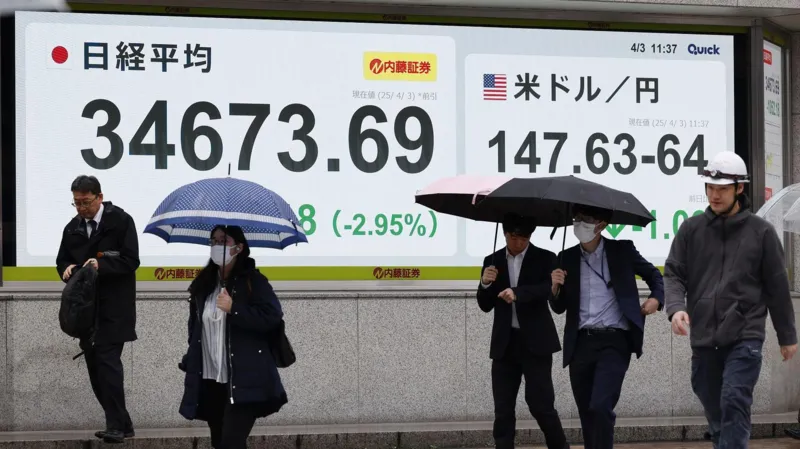Global stock markets fell on Thursday as investors reacted to US President Donald Trump‘s sweeping announcements on tariffs
Global stocks have fallen sharply and the US dollar hit a six-month low after Donald Trump unveiled sweeping tariffs against the US’s global trade partners in a move that is expected to upend supply chains and cause economic turmoil..
The UK’s FTSE 100 share index fell 1.5% and other European markets were also lower, echoing falls seen earlier in Asia.
While Global stocks fell, the price of gold, which is seen as a safer asset in times of turbulence, touched a record high.
Traders are concerned about the global economic impact of Trump’s tariffs on the global stock market, which they fear could stoke inflation and stall growth.
Markets across Asia had fallen sharply after Trump’s announcement, with the Nikkei in Japan closing down nearly 3% and Hong Kong’s Hang Seng index 1.5% lower. European markets were down across the board on Thursday after a sharp sell-off across Asia, and US futures signaled similar falls when Wall Street opens.
Shares in Europe followed the downward trend, with Germany’s DAX index down 1.9% and France’s CAC 40 dropping 2.6%.
European Commission chief Ursula von der Leyen said, “the global economy will massively suffer” and that “the consequences will be dire for millions of people around the globe.”
The price of gold hit a record high of $3,167.57 an ounce at one point on Thursday before falling back to $3,090.
Futures markets also suggest US shares will open lower when trading begins later. The S&P 500 is indicated to fall by 3.2% and the Nasdaq – which is dominated by tech stocks – set to drop 3.7%.
The dollar also weakened against many other currencies. The pound rose by more than 1% against the US currency to touch $1.32 at one point before slipping back.
The decision by the US government to impose a combination of a 10% baseline levy and higher duties on a number of other trading partners reverses decades of liberalization that shaped the global trade order.
“This is the worst-case scenario,” said Jay Hatfield, chief executive at Infrastructure Capital Advisors.
“Enough to potentially send the US into a recession,” he added, echoing nervous market sentiment.
- updates: Reaction to Trump’s tariffs announcement
- At a glance: The countries hit hardest by these plans
- Analysis: The biggest change to global trade in 100 years
- Watch: Three things to know about Trump’s plans
George Saravelos, head of FX at Deutsche Bank Research, said the new US trade tariffs were a “highly mechanical” reaction to trade deficits, rather than the “sophisticated assessment” the White House had promised.
Mr Saravelos warned the move “risks lowering the policy credibility of the [Trump] administration”.
“The market may question the extent to which a sufficiently structured planning process for major economic decisions is taking place. After all, this is the biggest trade policy shift from the US in a century,” he said.
Shares in sportswear firm Adidas fell more than 10%, while stocks in rival Puma tumbled more than 9% as key countries where their goods are made were hit with steep levies.
The new taxes include a 54% tariff on US imports from China and 46% on goods from Vietnam.
Among luxury goods firms, jewellery maker Pandora fell more than 12%, and LVMH (Louis Vuitton Moet Hennessy) dropped 5% after tariffs were imposed on the European Union and Switzerland.
There are worries that the tariffs could affect US consumer spending, which is a massive part of the global economy – between 10% and 15%, according to some economists’ estimates.
However, Trump’s tariffs may also benefit China by allowing President Xi Jinping to portray his country as a champion of free trade, the BBC’s China correspondent Stephen McDonell says. Countries could be encouraged to build or strengthen their trade relationships with China.





![Randfontein ‘tornado’: Dozens injured as clean-up operations continue [VIDEO]](https://newsunplug.co.za/wp-content/uploads/2024/11/Citizen-Photo-Template-480x320.jpg)

